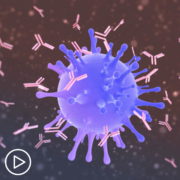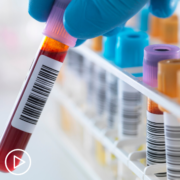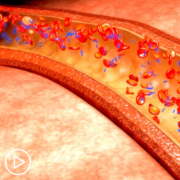What Are Follicular Lymphoma Considerations for Watch and Wait?
What Are Follicular Lymphoma Considerations for Watch and Wait? from Patient Empowerment Network on Vimeo.
What do follicular lymphoma patients and providers need to be aware of during watch and wait? Expert Dr. Kami Maddocks from Ohio State University discusses what factors are monitored during watch and wait, common symptoms to be on the lookout for, and who patients can contact about concerns.
See More from START HERE Follicular Lymphoma
Related Resources:

|

|

|
Transcript:
Lisa Hatfield:
One person is saying, “I’m in watch and wait currently. Is it possible that I’ll never need treatment, or how long do you wait, and what am I waiting for?”
Dr. Kami Maddocks:
That is a great question. There are patients in watch and wait who will never require treatment. Watching and waiting, we’re watching blood counts, watching the size of lymph nodes. So things that we’re watching for and you’re watching for are changes in lymph nodes size, so are they growing? Are they becoming more symptomatic? Is there a rapid change in them? Are we seeing a change in the blood counts? Are patients starting to have a drop in their blood counts which can happen if somebody’s spleen is getting bigger if they have lymphoma in their bone marrow and that’s progressing, watching for if the lymph nodes are causing a problem, you notice somebody have one in a location like the neck that’s starting to make swallowing difficult or changes in voice, that’s something you want to treat. And then there’s something called B symptoms that we watch for. So if the patient had night sweats…
…night sweats are like drenching night sweats, soak the bed, have to change clothes potentially sheets, fevers, so daily fevers that occur, or significant or rapid weight loss for no reason. All those are kinds of things that we want people to watch for. And we discussed a little bit too if patients start having extreme fatigue, not feeling well, not being able to eat, not having appetites if they have a new pain. And again everybody can have aches and pains. But if you’re having pain that’s not going away or some sort of symptom that’s not improving, those are all things we want to definitely have checked out.
Lisa Hatfield:
I imagine with some of your patients in that mode, there’s what I call the mental gymnastics of thinking, okay, I have this cancer, but I can’t do anything about it, and these symptoms are really vague that come up. So do you allow your patients just to contact you if they’re saying, “I think I have these symptoms, I’m nervous about this.” Can they come in and have a visit with you or contact you at any time?
Dr. Kami Maddocks:
Oh, yes. So we have a 24-hour triage line. I recommend that if patients have a question or concern, it’s better to ask us because if we don’t know about it, we can’t help is the first thing. Usually, we talk to the patient and say, “Okay, how long has this been going on” and see if it’s a red flag like you need to come in right now or is this something that maybe we might recommend getting a set of labs to look at certain labs to see if they’ve changed at all.
We might say, “Okay this seems like something we should actually see you for, but I want CT scans too so let’s order them, so I can have that information when you see me.” So, yeah, I think people should always call with any signs, symptoms, concerns, and then it can be addressed. Now, there are some things that we might say, “Okay, we think based on everything that new cough is probably more likely a respiratory infection. It’s okay to see your PCP.” But we also go through that as well. So yes, I think it’s always best to check in and not let something go.
Lisa Hatfield:
I’m guessing that’s challenging for some of those people in that mode, just thinking, well, I’m just waiting here, so that’s got to be a little bit more challenging.
Dr. Kami Maddocks:
I think you’re absolutely right. And sometimes there’s a benefit to…certainly like rituximab (Rituxan) therapy when there is a disease there, and it is a challenge to think that it’s not being treated.
Share Your Feedback:
Create your own user feedback survey










